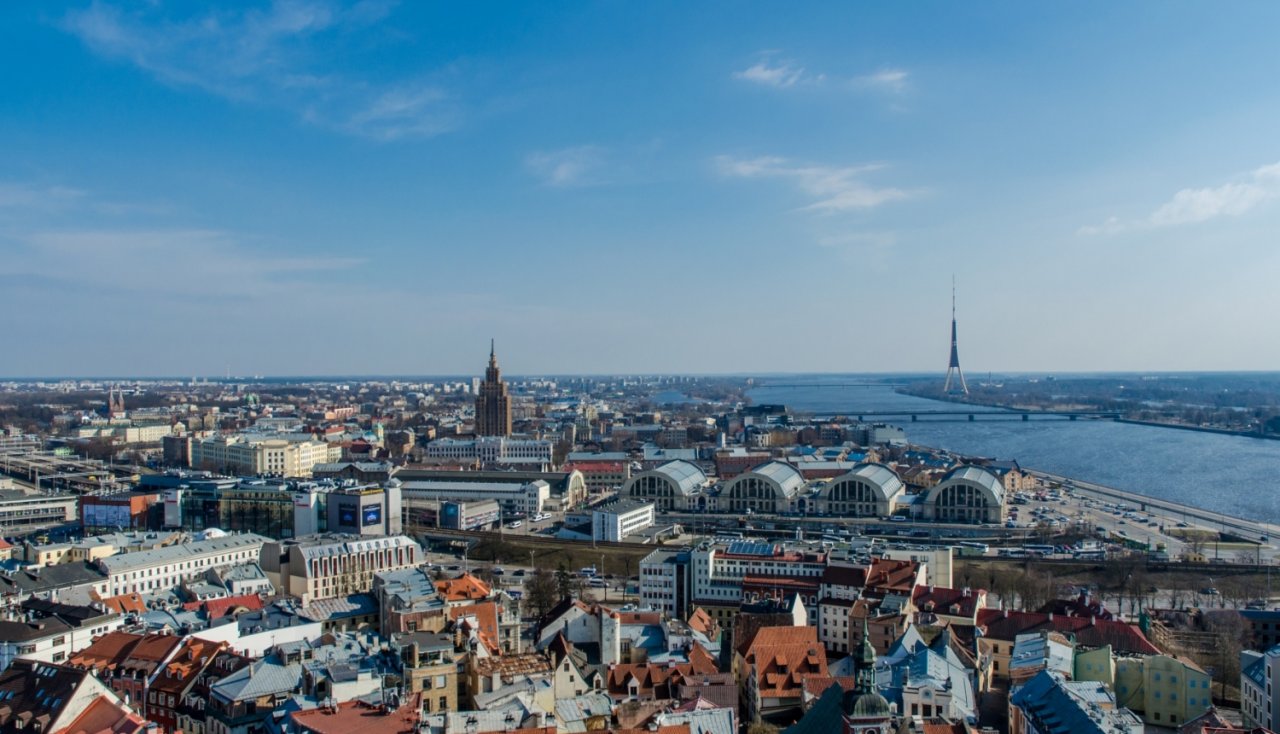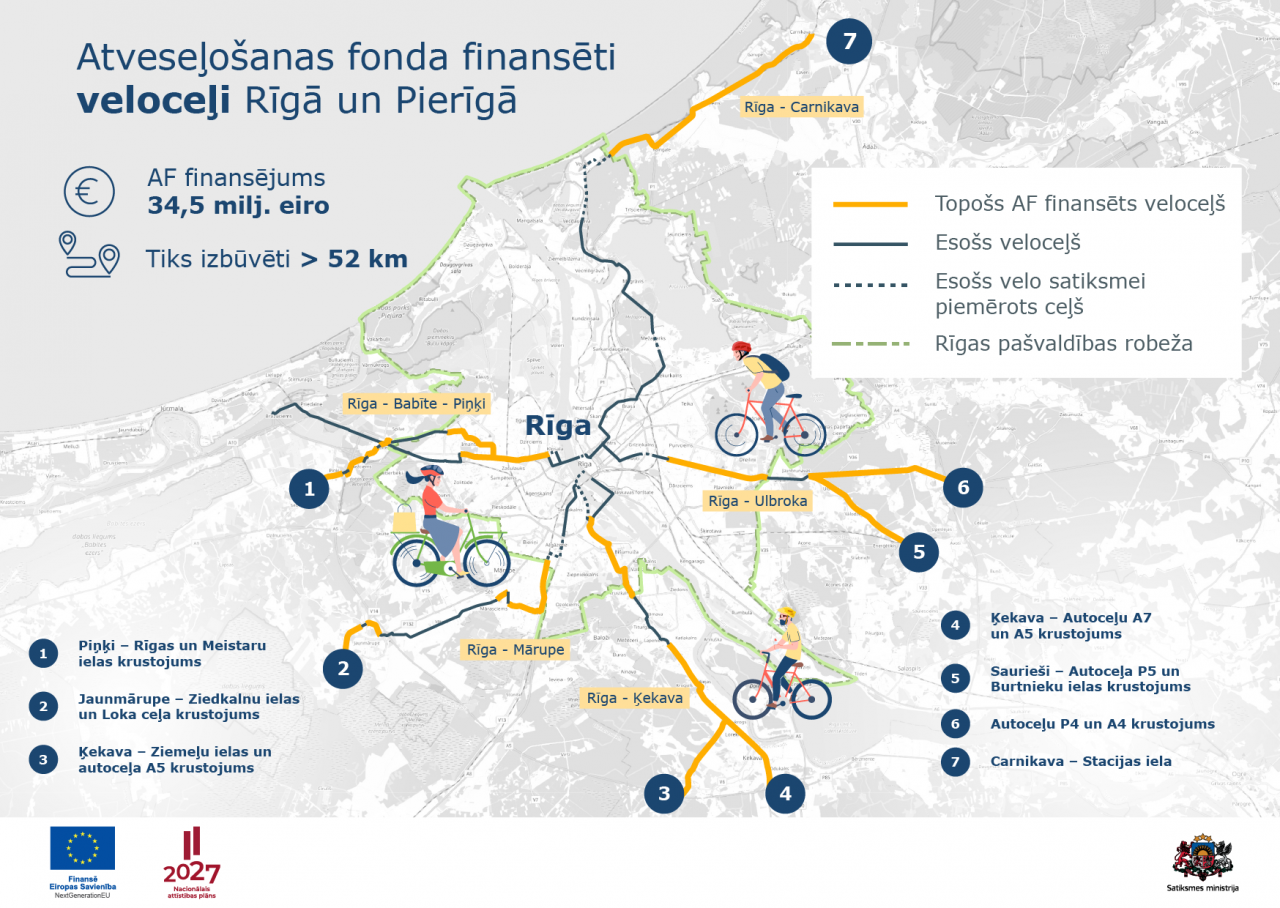In April 2023, the Supervisory Commission of the RRF of the Ministry of Transport (MoT) met at its regular meeting to evaluate the implementation progress of both the reforms: greening of the transport system of the Riga metropolitan area and the development of the Broadband infrastructure. The meeting heard reports on the progress of the projects funded by RRF and on the measures planned for implementation of the reforms in the near future.
According to the plan for the implementation of the reform on greening of the Riga metropolitan area transport system, an informative report on the allocation of EUR 74.4 million for the purchase of battery trains (BEMU) has been approved to promote better integration of rail passenger transport in the overall public transport system of Riga. BEMU trains will provide passenger transport on non-electrified lines, thereby improving the quality of the services provided. Development of the procurement documentation (2nd phase) for trains is in the process to ensure that the State Ltd „Road Transport Administration” which is the beneficiary will be able to purchase BEMU trains by 30 June 2026.
The purchase of BEMU trains takes place in synergy with the electrification plan of the railway network implemented by the SJSC “Latvijas dzelzcels” (LDz). The Cabinet of Ministers has approved the regulatory framework developed by the MoT, which determines the procedures for implementing and monitoring the RRF investment for the development of emission-free rail infrastructure and its integration into the overall public transport system of the city of Riga. In accordance with the provisions of the Cabinet of Ministers, RRF in the amount of EUR 72.7 million will be allocated to LDz, which will build an electrified railway line Zasulauks-Bolderaja by March 31, 2026, as well as modernize the existing Riga-Zemitani and Riga-Priedaine railway lines. Currently, an environmental impact assessment has already been carried out and work is underway on the development of procurement documentation.
According to the Cabinet of Ministers regulation, RRF funding in the amount of EUR 72.7 million will be allocated to LDz for construction of an electrified railway line Zasulauks-Bolderaja by 31 March 2026 and modernization of the existing railway lines, such as Riga-Zemitani and Riga-Priedaine. An environmental impact assessment has already been carried out and work on the development of procurement documentation is ongoing.
RRF in the amount of EUR 89.59 million is planned for multimodal mobility, with a total of eight mobility points in Riga and Pieriga – Bolderaja, Skirotava, Zemitani, Sarkandaugava, Dauderi, Ziemelblazma Carnikava and Saulkrasti, providing for public transport connections with the railway. Riga city municipality is the implementing body of the mobility points in the capital. Riga has already carried out a feasibility study and prepared documentation for the procurement of construction projects in order to commence them this year. In Pieriga, the development of mobility points is carried out by Adazi and Saulkrasti municipalities. Documents for Carnikava Mobility point development is currently being prepared to start procurement of design, while procurement of the feasibility study and a draft of designs for the development of Saulkrasti Mobility point has already been published.
In addition to mobility points development, environmentally friendly improvements to the public transport system in Riga are being made. The parties concerned have been consulted on the extension of the tram line. Documentation has been prepared in order to start the procurement of the construction project in the first half of 2023. At the same time, work is being carried out on the construction of an independent public transport line. Riga city municipality has made a design procurement in order to conclude a contract for design and royalty works in the near future. RRF support is also intended for the provision of public transport services in the city of Riga, namely new electric buses will be purchased and electric charging stations will be set up by the end of 2025.
In order to ensure green mobility and to create preconditions for the development of city and neighborhood connections, EUR 34.5 million has been allocated from the RRF for the improvement of the bicycle path infrastructure which has already been started. As a result of improvement a unified bicycle path infrastructure will be built and five priority cycling routes will be developed: Riga – Carnikava, Riga – Ulbroka, Riga – Kekava, Riga – Babite – Pinķi and Riga – Marupe. In accordance with the goal of the investment, five municipalities - Riga state city, Ropazi, Kekava, Marupe and Adazi are currently submitting projects for the construction, reconstruction, renovation, improvement or adaptation of the bicycle paths. The above-mentioned municipalities must submit projects to the MoT by July 31, 2023, while the development of bicycle routes is to be implemented by May 31, 2026.
In order to improve the public transport system in the capital, a unified public transport plan will be developed in the Riga metropolitan area. This will promote wider use of public transport for large passenger flows and reduction of the use of private car transport, offering more opportunities for passengers to plan their trips with different modes of transport, including cycling and other micro-mobility tools. A study is being carried out in 2023, which will result in proposals for a sustainable integrated public transport plan for the Riga metropolitan area by 2040, as well as recommendations for the establishment and implementation of a single public transport ticket system.
Along with the funding allocated for the development of the transport system, the MoT also monitors RRF investments for the communications sector, including implementation of the broadband infrastructure development reform. In order to ensure a project for the deployment of passive infrastructure in the Via Baltica corridor 5G coverage, the MoT has issued a public consultation on the State aid programme for this purpose by 31 May 2023. In the public consultation, the MOT requests comments on the planned involvement of the state and on the main characteristics of this process, as well as the submission of justified information on networks located or planned to be deployed in the area of the investment. On the other hand, the Regulations of the Cabinet of Ministers on the “Last mile” electronic communications infrastructure development are currently in the development phase and are being aligned with the parties involved. This regulation will set out the selection procedures, the criteria for selecting project implementers, as well as the conditions for obtaining funding for implementation. The project is being implemented to promote the compliance of electronic communications services with the European Union and national strategic connectivity objectives.
On RFF funded reforms in the field of transport and communications
To reduce the impact of transport on the environmental quality of the capital and to develop integrated public transport services that meet the needs of the population, by strengthening the role of the rail as the backbone of public transport, the reform of public transport in Riga and Pieriga under the auspices of the MoT is being implemented. Investments under the reform are expected to change the daily habits of people – encouraging residents to shift from individual transport to public, which in turn will contribute positively to the achievement of the European Green Deal. The total amount of investment for the reform is EUR 295 million.
With a view to facilitate transition to very high-performance electronic communications networks, which will provide residents with access to fast internet throughout the country, the MoT is undertaking a reform on the development of broadband infrastructure, with a total of EUR 16.5 million RFF funding.


